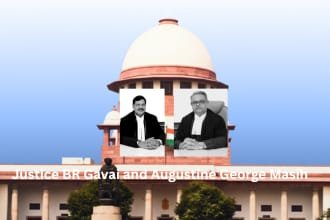In a defining moment for gender equality in the Indian Armed Forces, the Supreme Court of India recognized and lauded the contributions of Colonel Sofiya Qureshi while delivering its landmark judgment in The Secretary, Ministry of Defence vs Babita Puniya and Others (2020). The ruling, authored by Justice DY Chandrachud, decisively broke long-standing gender barriers by granting Permanent Commission (PC) to women officers in the Indian Army, a decision that continues to resonate powerfully in 2025 and beyond.
Colonel Sofiya Qureshi: A Trailblazer in the Indian Army
Among the many women officers acknowledged in the Supreme Court’s historic judgment, Colonel Sofiya Qureshi’s name was featured prominently. She holds the distinction of being the first Indian woman to lead an Army contingent at a multinational military exercise—“Exercise Force 18”—which was the largest foreign military exercise hosted by India. Colonel Qureshi is an officer from the Army Signal Corps, an elite wing responsible for military communication systems.
Her international service is equally commendable. In 2006, she served with the United Nations Peacekeeping Operation in Congo, taking charge of monitoring ceasefire agreements and spearheading humanitarian efforts in conflict-ridden regions. The Court observed that her duties involved maintaining peace and stability in some of the most volatile zones—testimony to her capability, courage, and leadership.
Operation Sindoor: A Symbol of National Unity
Fast forward to 2025, Colonel Qureshi was once again in the spotlight—this time as one of the key figures addressing the nation after the Indian military conducted successful counter-terror operations, codenamed Operation Sindoor. Alongside Wing Commander Vyomika Singh of the Indian Air Force, Colonel Qureshi’s public address stood as a powerful symbol of national unity and fraternity.
The press briefing sent a strong message: two women officers from different faiths representing the armed forces at a critical juncture showcased the inclusive ethos of the Indian military and struck a blow against attempts to create communal disharmony—such as the Pahalgam terror attack that sought to polarize society.
Justice DY Chandrachud’s Groundbreaking Observations
In 2020, while granting women the right to a Permanent Commission in the Indian Army, Justice DY Chandrachud had rejected the Union Government’s outdated arguments that questioned the suitability of women for such roles. These contentions, based on biological and social stereotypes, were termed “disturbing” by the Court.
The judgment emphasized that such claims ignore constitutional values and undermine the dignity of both women and the armed forces. The Court noted:
“To cast aspersion on their abilities on the ground of gender is an affront not only to their dignity as women but to the dignity of the members of the Indian Army – men and women – who serve as equal citizens in a common mission.”
Other Women Officers Recognized by the Supreme Court
Colonel Qureshi was not alone in being acknowledged. The Court highlighted the exemplary service records of multiple women officers, thereby reinforcing its conclusion that gender should not be a barrier in granting a Permanent Commission.
- Lieutenant Colonel Anuvandana Jaggi led the UN Military Observers Team in Burundi and received commendations from both the UN and the Indian Army.
- Major Madhumita from the Army Education Corps became the first woman officer in India to receive a Gallantry Award (Sena Medal) for her heroic efforts against Taliban terrorists in Afghanistan. Her actions saved numerous lives during evacuation and rescue missions.
- Lieutenant A. Divya received the Sword of Honour at the Officers Training Academy in Chennai, outperforming over 170 male officers—a clear indicator of women’s excellence in rigorous military training.
- Major Gopika Ajitsingh Pawar was decorated with the UN Peacekeeping Medal for her contributions to the UN Interim Force in Lebanon.
- Officers like Major Madhu Rana, Preeti Singh, and Anuja Yadav earned the UN Medal for their services in the Democratic Republic of Congo.
- Captain Ashwini Pawar and Captain Shipra Majumdar were awarded the Sewa Medal by the President of India in 2007, recognizing their commendable field service.
Supreme Court’s Strong Stand for Equality
The apex court unequivocally stated that women officers have brought laurels to the Indian Army. The argument that their contributions are less valuable due to gender was rejected with strong language. The Court emphasized that gender cannot be a basis for exclusion, particularly in a profession defined by merit, discipline, and sacrifice.
It also noted that since 2004, women officers have participated in UN Peacekeeping Missions in Syria, Lebanon, Ethiopia, and Israel. They have also served in Quick Reaction Teams, taken on logistical responsibilities in high-risk areas like Leh, Srinagar, and the North East, and performed duties equivalent to their male counterparts.
A Legal and Cultural Turning Point
The ruling in Babita Puniya v. Union of India is more than just a legal milestone. It represents a paradigm shift in the perception of women in combat and leadership roles within one of the most revered institutions of India. By highlighting the achievements of women like Colonel Sofiya Qureshi, the judgment underscored the urgent need to institutionalize gender equality across the military establishment.
Moreover, in light of continued geopolitical challenges and internal threats, the armed forces’ reliance on merit over gender becomes not just a matter of justice, but a matter of national security and efficiency.
Conclusion
The Supreme Court’s acknowledgment of Colonel Sofiya Qureshi and her peers not only validated their individual contributions but also paved the way for future generations of women in uniform. Their achievements reaffirm that capability knows no gender, and that diversity strengthens the armed forces.
As India celebrates its women warriors—whether on the battlefield, in peacekeeping missions, or at press briefings like Operation Sindoor—it becomes evident that true patriotism includes empowering every capable citizen, irrespective of gender. The Supreme Court’s visionary judgment is a proud chapter in this journey toward a more inclusive and stronger India.


